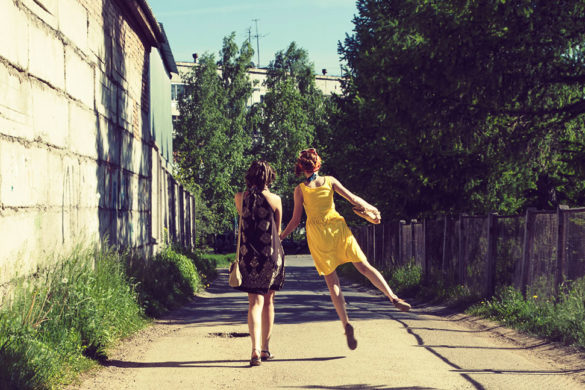There’s the “lighten up!” I sometimes got from a certain ex-boyfriend when what he really meant was: “Say, why don’t you just relax and do it my way?” There’s the “lighten up” that means, “Hey, cheer up — don’t be so hard on yourself!” And, of course, there are a variety of other context-driven “lighten ups,” most of which suggest reducing your physical burdens or emotional worries in some way.
The interesting thing about the phrase “lighten up,” particularly when it comes as a directive from someone else, is that it often carries an implied criticism, as in, “Silly person, you are worrying about something you shouldn’t be,” or “Uptight person, you are being inappropriately rigid and humorless!” Which means, of course, that the minute someone utters that phrase, you now have something else to feel worried and burdened about.
Given that, I think it’s natural to feel a certain amount of ambivalence whenever someone comes at you with the suggestion that you “lighten up.” This is particularly true when the person making that suggestion is ostensibly interested in convincing you to move off your position, thus allowing him or her to proceed unhindered by your pesky concerns.
But there’s also a very different sort of “lighten up” — one that comes as an internally issued invitation, not an external command. This is the “lighten up” request we hear from our bodies when they become tired, heavy, loaded down with excesses. It’s the “lighten up” we hear from our minds when they are so loaded down with problems that they can no longer perceive useful information or think creatively. It’s the “lighten up” we hear from our spirits when our souls are so burdened with worry, fear and regret that we lose our capacity for gratitude, praise and compassion.
The response to these internal “lighten up” requests often requires us not to ignore our concerns, but rather to reframe them, to view them more discerningly. Very often, it means looking down beneath the surface of the flotsam and jetsam to see why all that stuff happens to be gathering there in the first place.
For example: We may decide to do a detox because of concerns about the chemicals that have made their way into our bodies. But where did those chemicals come from? How are they making their way into our environment, and what part can we play in stemming the tide? The desire to unburden our own bodies from their toxic load may lead us to rather sobering discoveries about the impacts of our own consumer habits — and to even heavier messages about our personal and collective environmental responsibilities.
So should we just “lighten up” about these bigger concerns and forget about them? I don’t think so. Ultimately, the messages we receive at the personal level often reflect larger imbalances occurring at a global level. So should we forget all about personal tinkering and just strike out in the direction of grand causes? I don’t think that works either, because very often, the best (and sometimes only) way to change the world is to change ourselves.
Awareness and concern are good things, and I don’t believe that levity and responsibility are mutually exclusive. Striking the balance, of course, is a very personal art. My way involves subscribing both to The Onion (a very funny satirical paper: www.theonion.com) and to Ode (a more serious, but positive-minded progressive magazine: www.odemagazine.com). I spend some Saturday nights making music with my guitar-playing pals, and others engaged in more serious pursuits that I like to think might help change the world for the better. I listen carefully for those internal “lighten up” voices, and take the external ones with a grain of salt.
We compiled this issue of the magazine with the goal of offering you, our readers, a wide range of ideas and perspectives for improving your energy, vitality and resiliency. And for the record, when we say “lighten up,” all we really mean is: Hey, just relax and do it your way.

